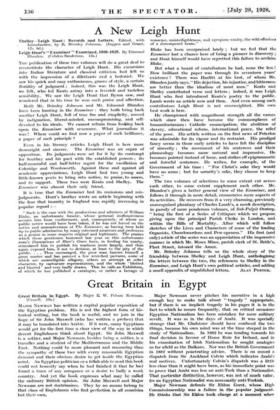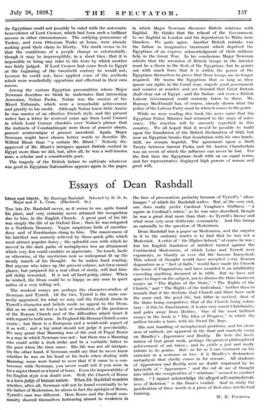Great Britain in Egypt Great Britain in Egypt. By Major
(Cassell. 15s.) E. W. Poison Newman.
MAJOR NEWMAN has written a capital popular exposition of the Egyptian problem. His is not the highest form of his- torical writing, but the book is useful, and we join in the hope of Sir John Maxwell (who has written a preface) that it may be translated into Arabic. If it were, many Egyptians would get for the first time a clear view of the way in which decent Englishmen think about Egypt. Sir John Maxwell is a soldier, and Major Newman, besides being a soldier, is a traveller and a student of the Mediterranean and the Middle East. Nothing could be more pleasant and reassuring than the sympathy of these two with every reasonable Egyptian demand and their obvious desire to get inside the Egyptian mind. An Egyptian politician or a fellah able to read this book could not honestly say when he had finished it that he had found a trace of any arrogance or a desire to bully a weak country. And yet the book expiesses what may be called the ordinary British opinion. Sir John Maxwell and Major Newman are not doctrinaires. They by no means belong to that class of Englishmen who find perfection in all countries but their own. Major Newman never pitches his narrative in a high enough key to make talk about " tragedy " appropriate, but if there is an implicit tragedy in his pages it is in the fact to which he recurs frequently, that on critical occasions Egyptian Nationalism has been mistaken for mere military revolt. It was so in the days of Arabi. It was specially strange that Mr. Gladstone should have confused the two things, because his own mind was at the time steeped in the study of Nationalism. In 1882 he was tending towards his final decision in favour of Home Rule for Ireland, and in his examination of Irish Nationalism he sought analogies as far afield as the Balkans. Nor was the British Government in 1882 without penetrating advice. There is on record a dispatch from Sir Auckland Colvin which indicates Arabi's real motives. Unfortunately Colvin's dispatch was a little less clear than it might have been, as his immediate point was to prove that Arabi was less an anti-Turk than a Nationalist. That particular distinction, however, was not of much value, for an Egyptian Nationalist was necessarily anti-Turkish.
Major Newman defends Sir Eldon Gorst, whose High Commissionership was a failure in the- popular judgment. He thinks that Sir Eldon took charge at a moment when
the Egyptians could not possibly be ruled with the autocratic benevolence of Lord Cromer, which had been such a brilliant success in other circumstances. The outlying possessions of Turkey, and even Ottoman Turks at home, were already making good their claim to liberty. The truth seems to be that the conditions of a people change so substantially, though it may be imperceptibly, in a short time, that it is impossible to bring any ruler to the tests by which another was fairly judged. If Lord Cromer had come fresh to Egypt at the beginning of the twentieth century he would not, because he could not, have applied some of the methods which were wonderfully opportune and effectual in their own season.
Among the various Egyptian personalities whom Major Newman describes we think he underrates that interesting Armenian, Nubar Pasha. Nubar was the creator of the Mixed Tribunals, which were a remarkable achievement and greatly to his credit. Although Nubar knew little Arabic be was master of an effective French style, and the present writer has a letter he received years ago from Lord Cromer in which Lord Cromer chuckles over Nubar's phrase that the instincts of Constantinople were those of pouvoir absolu, pouvoir aristocratique et pouvoir sacerdotal. Again, Major Newman might have chosen better words to describe Mr. Wilfrid Blunt than " a certain Mr. Blunt." Nobody dis- approved of Mr. Blunt's intrigues against British control in Egypt more than we did, but, after all, he was a well-known man, a scholar and a considerable poet.
The tragedy of the British failure to cultivate whatever was good in Egyptian Nationalism appears again in the pages in which Major Newman discusses British relations with Zaghlul. He thinks that the refusal of the Government to see Zaghlul in London and his deportation to Malta were blunders. We quite agree. Another British mistake was the failure in imaginative treatment which deprived the Egyptians of an express acknowledgment of their military help in the Great War. In his conclusions Major Newman admits that the retention of British troops in the interior must be a thorn in the flesh of the Egyptians, but he points out with much force that it is within the power of the Egyptians themselves to prove that those troops are no longer required. He warns the Egyptians that so long as they ignore our rights in the Canal zone, impede good government and connive at murder, and yet demand that Great Britain shall clear out of Egypt—and the Sudan—not even a British Labour Government could seriously listen to them. Mr. Ramsay MacDonald has, of course, already shown what the policy of the Labour Party must be when it comes to the point.
While we were reading this book the news came that the Egyptian Prime Minister had returned to the ways of auto- cracy. The reaction will be sincerely regretted in this country. We all hoped that it woui.d be possible to build upon the foundation of the British Declaration of 1922, but now an Egyptian breaks that foundation with his own hands. Still, we remain hopeful. The agreement upon a draft Treaty between Sarwat Pasha and Sir Austen Chamberlain was an event of which the influence can never be lost. For the first time the Egyptians dealt with us on equal terms, and her representative displayed high powers of reason and good will.





































 Previous page
Previous page